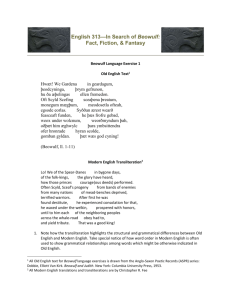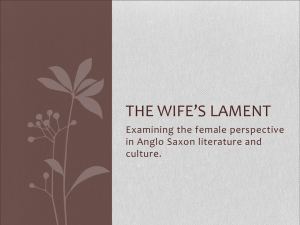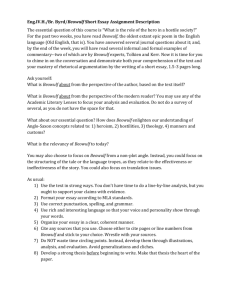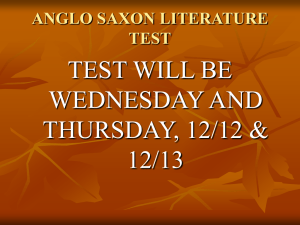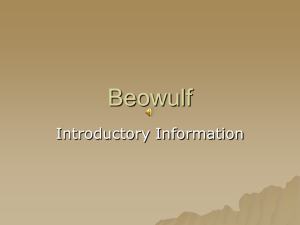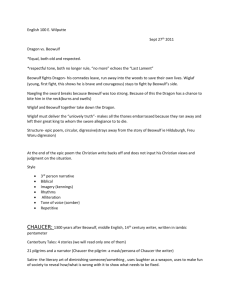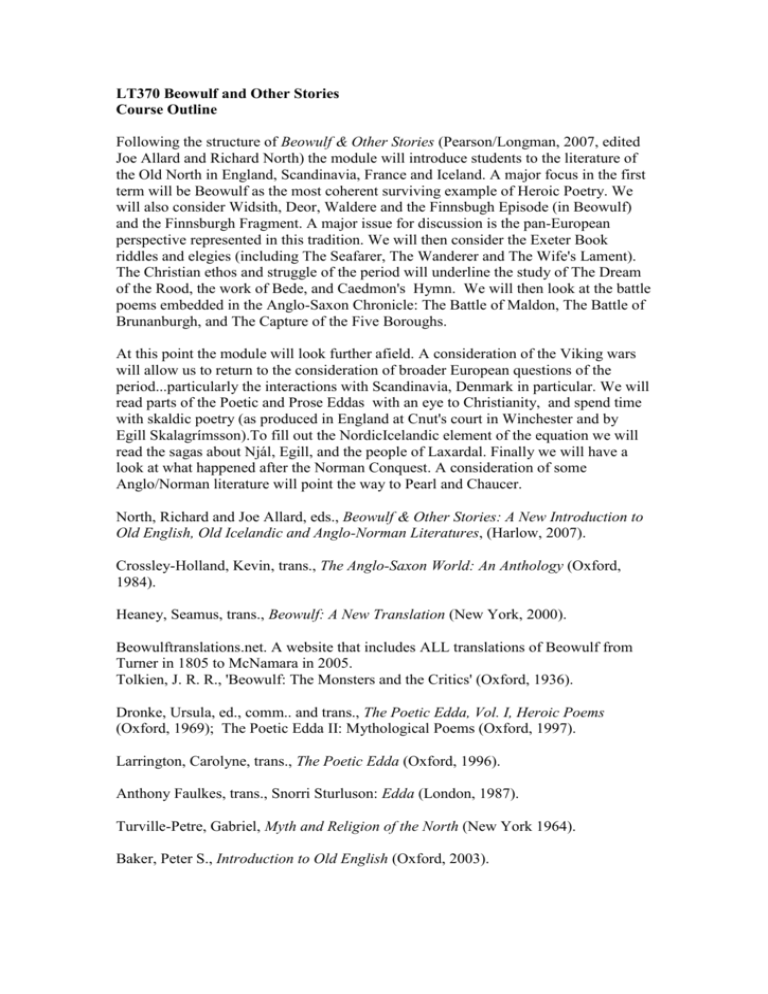
LT370 Beowulf and Other Stories
Course Outline
Following the structure of Beowulf & Other Stories (Pearson/Longman, 2007, edited
Joe Allard and Richard North) the module will introduce students to the literature of
the Old North in England, Scandinavia, France and Iceland. A major focus in the first
term will be Beowulf as the most coherent surviving example of Heroic Poetry. We
will also consider Widsith, Deor, Waldere and the Finnsbugh Episode (in Beowulf)
and the Finnsburgh Fragment. A major issue for discussion is the pan-European
perspective represented in this tradition. We will then consider the Exeter Book
riddles and elegies (including The Seafarer, The Wanderer and The Wife's Lament).
The Christian ethos and struggle of the period will underline the study of The Dream
of the Rood, the work of Bede, and Caedmon's Hymn. We will then look at the battle
poems embedded in the Anglo-Saxon Chronicle: The Battle of Maldon, The Battle of
Brunanburgh, and The Capture of the Five Boroughs.
At this point the module will look further afield. A consideration of the Viking wars
will allow us to return to the consideration of broader European questions of the
period...particularly the interactions with Scandinavia, Denmark in particular. We will
read parts of the Poetic and Prose Eddas with an eye to Christianity, and spend time
with skaldic poetry (as produced in England at Cnut's court in Winchester and by
Egill Skalagrímsson).To fill out the NordicIcelandic element of the equation we will
read the sagas about Njál, Egill, and the people of Laxardal. Finally we will have a
look at what happened after the Norman Conquest. A consideration of some
Anglo/Norman literature will point the way to Pearl and Chaucer.
North, Richard and Joe Allard, eds., Beowulf & Other Stories: A New Introduction to
Old English, Old Icelandic and Anglo-Norman Literatures, (Harlow, 2007).
Crossley-Holland, Kevin, trans., The Anglo-Saxon World: An Anthology (Oxford,
1984).
Heaney, Seamus, trans., Beowulf: A New Translation (New York, 2000).
Beowulftranslations.net. A website that includes ALL translations of Beowulf from
Turner in 1805 to McNamara in 2005.
Tolkien, J. R. R., 'Beowulf: The Monsters and the Critics' (Oxford, 1936).
Dronke, Ursula, ed., comm.. and trans., The Poetic Edda, Vol. I, Heroic Poems
(Oxford, 1969); The Poetic Edda II: Mythological Poems (Oxford, 1997).
Larrington, Carolyne, trans., The Poetic Edda (Oxford, 1996).
Anthony Faulkes, trans., Snorri Sturluson: Edda (London, 1987).
Turville-Petre, Gabriel, Myth and Religion of the North (New York 1964).
Baker, Peter S., Introduction to Old English (Oxford, 2003).
Baker, Peter S. 'Magic Sheet'.
http://www.engl.virginia.edu/OE/courses/handouts/magic.pdf. A one page summary
of Old English inflections.
Gordon.E.V.,ed., rev. A.R. Taylor, An Introduction to Old Norse (Oxcford 1956).
Byock, Jesse L., Viking Age Iceland (Harmondsworth, 2001).
Kristjánsson, Jónas, Eddas and Sagas, 1988, Foote, Peter, trans. (Reykjavík, 1992).
North, Richard, The Origins of Beowulf: From Vergil to Wiglaf (Oxford 2006).
Byock, Jesse, L., trans. and intro., The Saga of the Volsungs: The Norse Epic of
Sigurd the Dragonslayer (Los Angeles and London, 1990).
Treharne, Elaine, ed. and trans., Old and Middle English (Oxford, 2000).
Viðar Hreinsson, ed., The Complete Sagas of Icelanders Reykjavík, 1997). PT
7262.E5.


